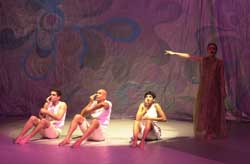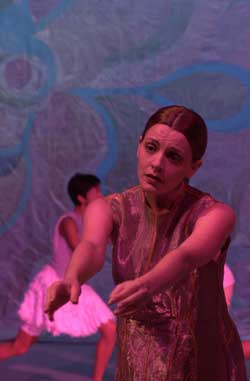
|
2000: The year in review
Working for Peace and Reconciliation |
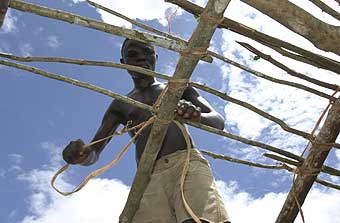
The especially destructive conflict in Sierra Leone moved the WCC to send a delegation of women to express solidarity with women who were suffering severely because of the civil war there. The women’s department in the Sierra Leone Council of Churches was found to be doing excellent work in response to a situation in which large numbers of women had seen their families murdered, their homes destroyed and they themselves had been raped, said Aruna Gnanadason, WCC executive for women’s programmes. The WCC also sponsored a similar women-to-women visit to Liberia from 26 July to 2 August. These solidarity visits were organized in cooperation with the All Africa Conference of Churches (AACC), the Lutheran World Federation and the Young Women’s Christian Association.
In October, WCC general secretary Konrad Raiser visited Nigeria, meeting with church and other religious leaders in many parts of the country, and with the president of Nigeria, Olusegun Obasanjo. One topic of special concern discussed during the visit was the introduction of Muslim law, sharia, in parts of the country, and the danger churches saw this bringing to religious freedom.

The WCC also began working with member churches to prepare for the UN World Conference against Racism, Racial Discrimination, Xenophobia and Related Intolerance, scheduled to be held in Durban, South Africa, in September 2001.
William Temu, programme executive for Africa, reported that in March the WCC arranged a two-day meeting in Nairobi of its central committee members from Africa with general committee members of the AACC, the first time this had been done. In some cases, the same individuals serve on both committees. Follow-up meetings for regions of Africa were held in September. Participants discussed what it meant for both organizations to share in the one ecumenical movement, and how each could maintain awareness of what the other was doing, Temu said.
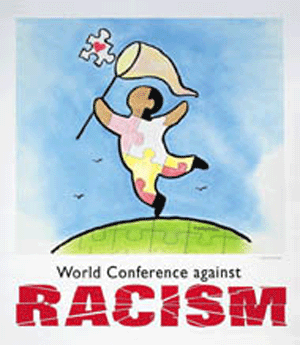
The WCC hopes to arrange similar meetings with AACC counterparts in other regions to increase the awareness that “the ecumenical movement is one movement”, says Huibert van Beek, programme executive for WCC relations with member churches and regional ecumenical bodies.
In addition to military conflict, the spread of AIDS is causing death, suffering and social disruption in Africa. Manoj Kurian, WCC executive for health programmes, said the Commission on World Mission and Evangelism decided at a meeting in March that AIDS ministries would be expanded, and that this is now “taking about 70 percent of my time”. The focus will be on Africa for the first two years, and Kurian helped arrange for church representatives to be heard at the international conference on AIDS held in Durban, South Africa, in July 2000.

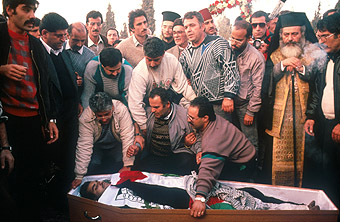
In a letter to UN secretary general Kofi Annan on 10 October, Raiser said both sides had suffered from the renewal of violence, but that it was “the Palestinian people, especially Palestinian youth, who pay by far the greater price in God-given life as a result of the disproportionate use of armed force by Israel”. The WCC Commission of the Churches on International Affairs hosted a three-member Palestinian delegation attending a special session of the UN High Commission on Human Rights in Geneva in October, and a WCC statement submitted to this UN body charged that Israeli actions were “delaying and often denying justice to the Palestinian people, both in the Occupied Territories and within Israel”. The WCC also called for UN investigation of “systematic violations of the human rights of the Palestinian minority in Israel”.
Addressing the Christian communities of Jerusalem in an Advent letter, Raiser wrote, “True peace is our shared goal, a peace built on the foundations of justice, so together with you we long for justice for the Palestinian people.” The WCC’s International Relations staff produced a background paper on Jerusalem, and the executive committee commended it to the churches for study.
Raiser visited the Philippines 10-17 March, his first visit to this country which is distinctive in Asia for having a majority Christian population. He was able to talk with a number of people about the conflict of the government with the National People’s Army and with the Moro Islamic Liberation Front on the island of Mindanao. He concluded that the Philippines was “suffering from a lack of clear and far-sighted leadership at the central level, making room for power deals, intrigues, corruption, rumours of military coups and a climate of growing uncertainty”.
In an effort to build a safer society not only in Africa and the Middle East but in all parts of the world, the WCC supported preparations by the United Nations for a conference in 2001 on control of small arms. In March, representatives of the WCC went to New York to attend a meeting of the preparatory committee for the 2001 Conference on Illicit Trade of Small Arms and Light Weapons in All Its Aspects. For its own preparation, the WCC joined with the Latin American Council of Churches to hold a consultation on small arms in Rio de Janeiro, Brazil, in July, and with African churches in Nairobi in October.

The conference did not in itself produce significant results, and did not bring together participants proportionately representative of the international religious community, or deal with issues at the level reached at some other inter-religious gatherings, Raiser said. But, according to the WCC general secretary, it was important as the first time the UN hosted such an inter-religious gathering, and because the UN secretary general Kofi Annan addressed the meeting.
During 2000 the WCC prepared for the 2001 launch of the Decade to Overcome Violence: Churches Seeking Reconciliation and Peace. The formal launching of the decade was anticipated by Indonesia and Denmark which held events to begin observance of the decade in November, and by Colombia where the Latin American Council of Churches held a launching event in January 2001.
In an unusual move, the WCC sponsored the appearance of a dance theatre troupe at Expo 2000 in Hanover, Germany, on 2 September, and subsequent performances elsewhere. The troupe’s presentation, “Peace to the City”, was a contribution to the Decade to Overcome Violence and told the story of seven cities in different countries that engaged in a 1997-98 campaign to reduce violence and build bridges of reconciliation.
The WCC received a number of responses from its member churches to the call for a Decade to Overcome Violence. Deenabandhu Manchala, who joined the WCC staff in March to coordinate activity related to the decade, said the churches want it to be a time of moral ferment in which they look for the causes of violence and seek to build a peace based on justice. But church leaders hold varying views on the legitimacy of using violence in the struggle for justice, as in the fight against white control in the countries of Southern Africa, he reported.

